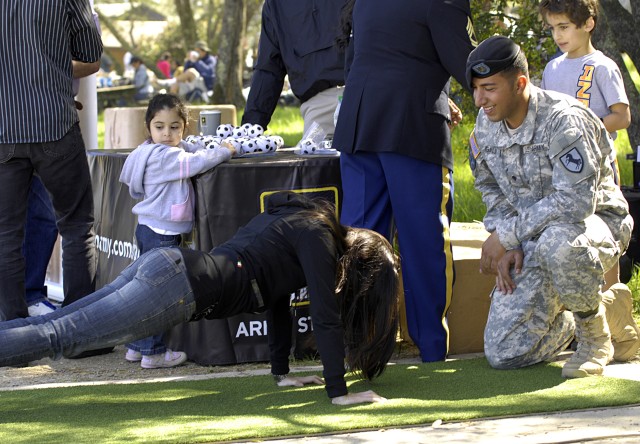SACRAMENTO, Calif. - To increase the number of U.S Army Farsi and Pashtu linguists operating in Afghanistan, U.S. Army Accessions Command now works directly with Persian communities at a grassroots level.
"Grassroots is always the best way to interact with people," said Maj. Bettina Avent, Accessions Command program manger overseeing the outreach. "It's much more engaging than basic advertising."
By actively participating in the Persian community, the Army hopes to build long-lasting ties with its people and culture. The effort is not without challenges. There are cultural and language differences to overcome, a history of mistrust toward government organizations and widespread misperceptions and misinformation about military service.
"They think they're going to be deployed to Iran to fight their own community," Avent said. "We have to explain to them that this is for Afghanistan. It's a time-consuming but ultimately rewarding process."
The move comes at a time when the United States is focusing more of its attention on the war in Afghanistan, where over 50 percent of the population speaks Farsi, and troop levels are on the decline in Iraq.
Avent said while Farsi is one of the dialects in Afghanistan, it is a primary language in Iran which is why members of the Afghanistan and Iranian community are of interest to the Army. Linguists not only translate for Army units, they offer understanidng of Afghan language and culture. This enables soldiers to communicate more effectively with the Afghan people.
Sacramento-area Army recruiters have been the first to participate in the new outreach efforts and have provided some early learning experiences, said Capt. James Grymes, commander of the Capitol Army Recruiting Company.
On April 3, they attended a Sizdeh Bedar event at the Folsom Park State Recreation Area. The event is an ancient Persian holiday celebrated by a daylong picnic. Many of the attendees were interested in the Army's message and the different benefits it includes.
"I enjoy the military life and the duty of the soldier," said one 22-year-old prospect, who previously served two years in the Iranian Army. He was particularly interested in the G.I. Bill to pay for college.
Recruiters had no idea how their participation at the event would be received, but when it was over they left with 29 information cards filled out by those interested in serving as linguists. Additionally, three prominent community leaders, including two educators, offered to serve as "centers of influence" to assist the Army with recruiting efforts.
"This event has been highly successful," said Grymes. "It is, more than anything, a chance to introduce ourselves to the community ... and people have seemed comfortable asking us questions."
In order to help Army recruiters approach the Persian community, Army Accessions Command has contracted with an outside agency that specializes in community outreach to Middle Eastern cultures, and it is relying on the existing Persian linguists already in its ranks.
Two of those linguists visited the Sizdeh Bedar event with the Sacramento recruiters. They served as the primary contacts to talk to everyone from prospects to curious members of the community.
Spc. Steven Ganji, who moved to the United States from Tehran at the age of 12, said he sees his work with Sacramento recruiters similar to what he did for the Army in Afghanistan. There, he served primarily as the liaison between his fellow soldiers and the local, Afghani-Farsi interpreters.
"I make the recruiters' job easier," Ganji said. "I think connecting to the community like this is better, and just me being here serves as an example to the community."
Ganji said he is able to relate to the concerns of fellow Persians considering joining the Army and, just as importantly, the concerns of their family members. But he noted that many of these worries are often universal. His own parents, he said, were more concerned about him facing combat than anything else.
Spc. Banipal Ghazanchian said many of the Persian people he talked to simply want specific information about what the Army wants from them and what opportunities it can provide. He said that many believe the Army is only offering them combat positions and do not realize how much it needs Farsi and Pashtu linguists.
"Attending these events is a way people can see the Army is working for them," he said. "These are largely American citizens, and many of them want to serve their country too."
Army Accessions Command is supplementing its outreach effort with advertising; direct mail; collateral materials, such as brochures in Farsi and Pashtu; media outreach to U.S.-based native language media outlets and event sponsorship.
To learn more about being a translator in the Army, visit goarmy.com/translator.


Social Sharing